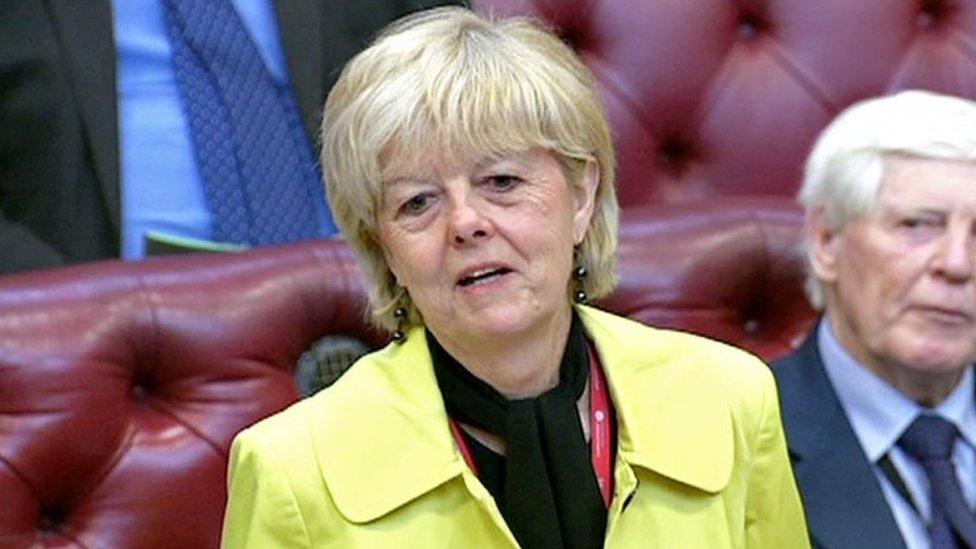Next Lord Speaker: Runners and riders
- Published
The Speaker of the House of Lords announces his retirement from the role.
Noble toes are dipping delicately into opaque waters of Lords opinion, after the Lord Speaker, Lord Fowler, announced he would be stepping down towards the end of April.
And if the waters seem welcoming a few cocked and tricorn hats might then fly into the ring, for what, by Lords standards, will be a pretty speedy election process,
For all the splendours the job brings, the perch on the Woolsack, presiding over the chamber, the prestige corner office, the place atop the parliamentary hierarchy, not to mention the hundred grand salary, the Lord Speakership seems to an outside eye to have very little actual clout.
There are no bellows of "Order, Order," and the Lord Speaker is most definitely not the enforcer in a House with a proud reputation for self-regulation, rather than reliance on a referee.
But there are some powers - the Lord Speaker can, for example, grant Private Notice Questions, the Lords equivalent of the Commons' Urgent Questions, and has a considerable behind the-scenes-role in the Lords machine.
But I suspect the main issue for peers, when they come to vote for a successor, will be the independence and powers of their House.
In the Parliamentary session which started in December 2019, and has yet to come to an end, the government has been defeated in the Lords 88 times - some of these votes have been relatively anodyne "regret motions," which are no more than an expression of noble distaste for some government action, but others have been stinging rebukes with real legislative consequences.

Baroness Hayter is seen by many as the favourite to succeed Lord Fowler
The two live ones at the moment are the "Alton Amendment" to the Trade Bill, on UK trade relations with genocidal regimes, where peers have defied the Commons three times, and on the ban on landlords passing on the cost of fire safety works to freeholders, in the post-Grenfell Fire Safety Bill.
In both cases the government has found itself spending political capital to try and overcome changes to legislation made by peers.
Might that lead to an attempt to clip the wings of the House of Lords, to limit its powers in some way?
Peers will want a Lord Speaker capable of defending their powers in public, and just as importantly, in private.
So who are the possible candidates?
Lady Hayter: Labour's deputy leader in the Lords may well be the favourite, with talk that the Labour and Conservative leaderships have done a deal to put her on the Woolsack. Her backers point to the muted cheer she received from all sides in the Lords when she appeared in the Chamber after having been sacked by Jeremy Corbyn. There might be some questions about leaping to the Woolsack from the deputy leadership of one of the parties, but she's a major player in the Lords.
Lord McFall: The former Labour MP John McFall, best known for chairing the Commons Treasury select committee at the time of the 2008 financial crisis. He is now the Senior Deputy Speaker and, most recently was responsible for moving the continuing suspension of the much-mocked by-elections to replace departed hereditary peers. He is well positioned and has long been expected to run for the top job.
Lord Kennedy of Southwark: A formidable Labour apparatchik, ennobled by Gordon Brown. Most Labour insiders think he'd prefer to be Chief Whip rather than move to a non-political post.
Lord Cormack: A Conservative former MP, and quintessential knight of the shires. He ran for the speakership of the Commons against John Bercow in 2009, and for the Lord Speakership in 2016. He will need to demonstrate serious cross-party appeal to be in with any chance. And it may count against him that he would be a Conservative replacing a Conservative.
Lord Alderdyce: A Lib Dem peer from their sister party, the Northern Ireland Alliance Party. He was the first Presiding Officer of the Northern Ireland Assembly. The Lib Dems think it's their turn to provide the Lord Speaker, with Labour, the Crossbenchers and the Conservatives having already done so. The other parties have little sympathy for this argument, and any Lib Dem running for the post will have to overcome their instinctive tribal distaste. If the tales of a carve-up by the two main parties come true, they will be pretty miffed.
Baroness Garden: A Lib Dem and one of the Deputy Speakers, she ran for Lord Speaker in 2016.
Lord Lisvane: The former Clerk of the Commons Sir Robert Rogers, now a Crossbencher. He's being mentioned a great deal, and would certainly bring a lifetime of procedural and parliamentary expertise to the job. But there has been no indication that he has any interest in it.
This will be a short campaign, because Lord Fowler plans to leave by late April (the probable time for a prorogation to end the current parliamentary year). Whatever the exact timetable for the elections, expected to be announced by the Lords Procedure Committee next week, there will be little chance for a surprise contender to establish themselves.
Much of the entertainment value in this contest will be in the stupendous cattiness of some of the red-bench commentary; "they'll put X on the Woolsack just to shut him up…" "they'll be glad to get rid of X," "we've all heard him banging on, and we don't want to hear any more than we have to…" "delusional vanity candidate" and, my favourite, "too pompous even for us."
And that was after less than 24 hours.
